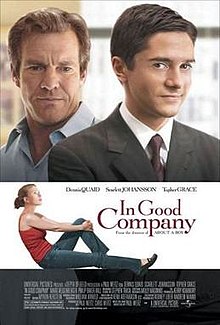“I totally phoned in that Dennis Quaid movie!”
So said Topher Grace in Ocean’s Twelve, but don’t take him seriously. I’ve yet to see the guy be less than charming and hilarious on screen. Even in forgettable crap like Win a Date with Tad Hamilton!, he manages to be entertaining and likable. Here he doesn’t have to worry about being the only bright spot in a heap of crud. This is a well crafted, smart and heartfelt piece which, while not as great as “About the Boy”, confirms that Paul Weitz is a filmmaker to watch for (let’s pretend “Down to Earth” never happened).
Dennis Quaid stars as Dan Foreman (not to be confused with Eric Forman, the character Grace plays on That ‘70s Show), a 51-year-old good old boy, old-fashioned kind of guy who heads the ad sales department of a sports magazine. He’s got a perfect little wife, perfect little daughters and a perfect little life. It’s all good… Until a multinational corporation buys out the publisher that owns Sports America and 26 year old “ninja assassin” corporate hotshot Carter Duryea (Grace) is brought in to increase ad pages, reduce the payroll and enforce the company’s bottom-line thinking.
His wife (Selma Blair) having just walked out on him, Carter leeches onto Dan, who might find himself inferior to him in this new business culture but who’s more successful than anyone could hope for as far as home and family go. Carter takes a special interest in Alex (Scarlett Johansson), the oldest Foreman daughter, around whom he feels “bizarrely honest”, but I don’t see it. Oh, the Scarlett’s hot as hell, but there’s zero chemistry between Topher and her. This would be a deal-breaker if this was a romantic comedy, but Carter’s daughter-sausageing mostly serves as a way to (effectively) add further conflict to the story’s central relationship, between the old fart and the young asshole.
I’ve mentioned how endearing I find Topher Grace to be, but Dennis Quaid owns this movie. It’s rare to find a film that is able to stop glorifying youth and show respect for maturity and experience instead, and Quaid wonderfully embodies that. The antagonism between the two is very interestingly played. It would have been easy to do a good guy/bad guy thing, but this film’s able to see nuances. Foreman and Duryea are not enemies, they just disagree.
As writer and director, Paul Weitz must certainly be applauded for how lovely his film is, but cinema is a collaborative medium and Weitz surrounded himself well. Cinematographer Remi Adefarasin makes everyone and everything look gorgeous, editor Myron Kerstein keeps things flowing without rushing them and composer Stephen Trask nicely underlines scenes musically, as does the use of songs by The Soundtrack of Our Lives, Damien Rice and others. Little things like the lack of chemistry between Grace and Johansson keep “In Good Company” from greatness but it remains, in the words of one of its characters, PFG: Pretty Fucking Good.

